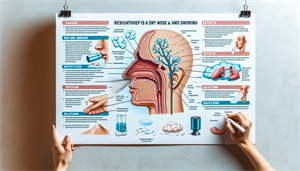
Can Dry Nose Cause Snoring?
If you’re wondering whether a dry nose can lead to snoring, the answer is yes. In fact, a “can dry nose cause snoring” situation can arise due to the impact on the nasal passages and air flow during sleep. In this article, we’ll explore how a lack of moisture in the nasal cavity can cause breathing difficulties and promote the conditions that lead to snoring. We’ll also discuss the underlying causes, preventative measures, and solutions for a dry nose to help ensure a quieter, more restful sleep.
Key Takeaways
-
A dry nose can contribute to snoring by causing congestion and difficulty in breathing through the nose, leading to vibrations in the throat while sleeping.
-
Factors causing a dry nose and subsequent snoring include dehydration, environmental irritants, sinus problems, nasal polyps, certain medications, and changes in humidity and temperature.
-
Preventative measures against dry-nose related snoring include maintaining hydration, using humidifiers to moisturize the air, and applying nasal saline sprays to keep nasal passages moist.
Dry Nose and Snoring: The Connection
Snoring, often the bane of a peaceful night’s sleep, can be traced back to multiple causes, one of which is a dry nose. When the nose lacks moisture, it becomes less effective at warming and moisturizing the air, leading to congestion and difficulty in breathing through the nose. Consequently, this results in vibrations in the throat and mouth, generating the characteristic sound of snoring. Sinus problems, such as sinus infections or allergies, can amplify this issue. These conditions lead to nasal congestion or obstruction, forcing a person to breathe through their mouth. This can relax the muscles in the back of the throat and narrow the airway, increasing the risk of tissues vibrating and creating the snoring sound when air passes through.
Nasal Congestion
Nasal congestion, a common symptom of a cold or allergies, can directly contribute to snoring. When individuals are forced to breathe through their mouths due to a blocked nose, the likelihood of snoring increases. Moreover, when the nose is narrowed or blocked due to a cold or other issues, fast-moving air through this restricted space is more likely to produce noisy snoring sounds.
Nasal polyps, growths that develop in the inflamed tissue of the sinuses and nose, can further obstruct the nasal passages. This obstruction can lead to mouth breathing, a major contributor to snoring. However, there are solutions available. Some options to decrease snoring include:
-
Nasal strips: These can enhance airflow through the nasal passages by actively maintaining the nostrils open and preventing congestion from restricting the airways.
-
Nasal dilators: These are small devices that are inserted into the nostrils to help keep them open during sleep.
-
Nasal sprays: These can help reduce inflammation and congestion in the nasal passages, allowing for easier breathing and reducing snoring.
It’s important to consult with a healthcare professional to determine the best solution for your specific situation.
Reduced Airflow
Reduced airflow is another key contributor to snoring. When airflow is limited during sleep, it leads to a rumbling, rattling sound. Conditions like chronic sinusitis can exacerbate snoring by causing inflammation and congestion in the nasal passages, further restricting airflow and increasing the likelihood of snoring. Physiological changes in the nasal passage when airflow is reduced encompass:
-
Nasal congestion
-
Irritation
-
Inflammation
-
Increased mucus production
These changes can also affect the soft palate, causing it to vibrate during sleep and contribute to the sound of snoring. Understanding the reasons behind reduced airflow enables us to apply effective remedies.


